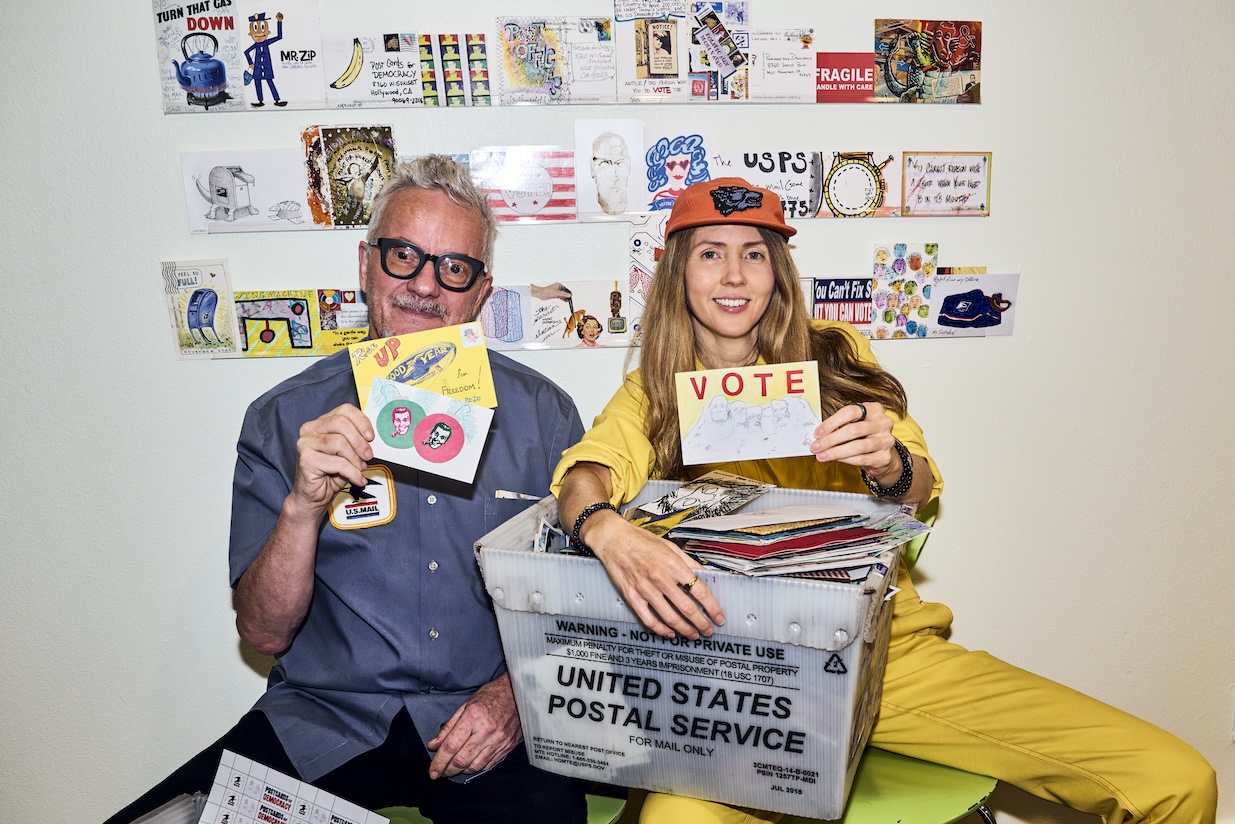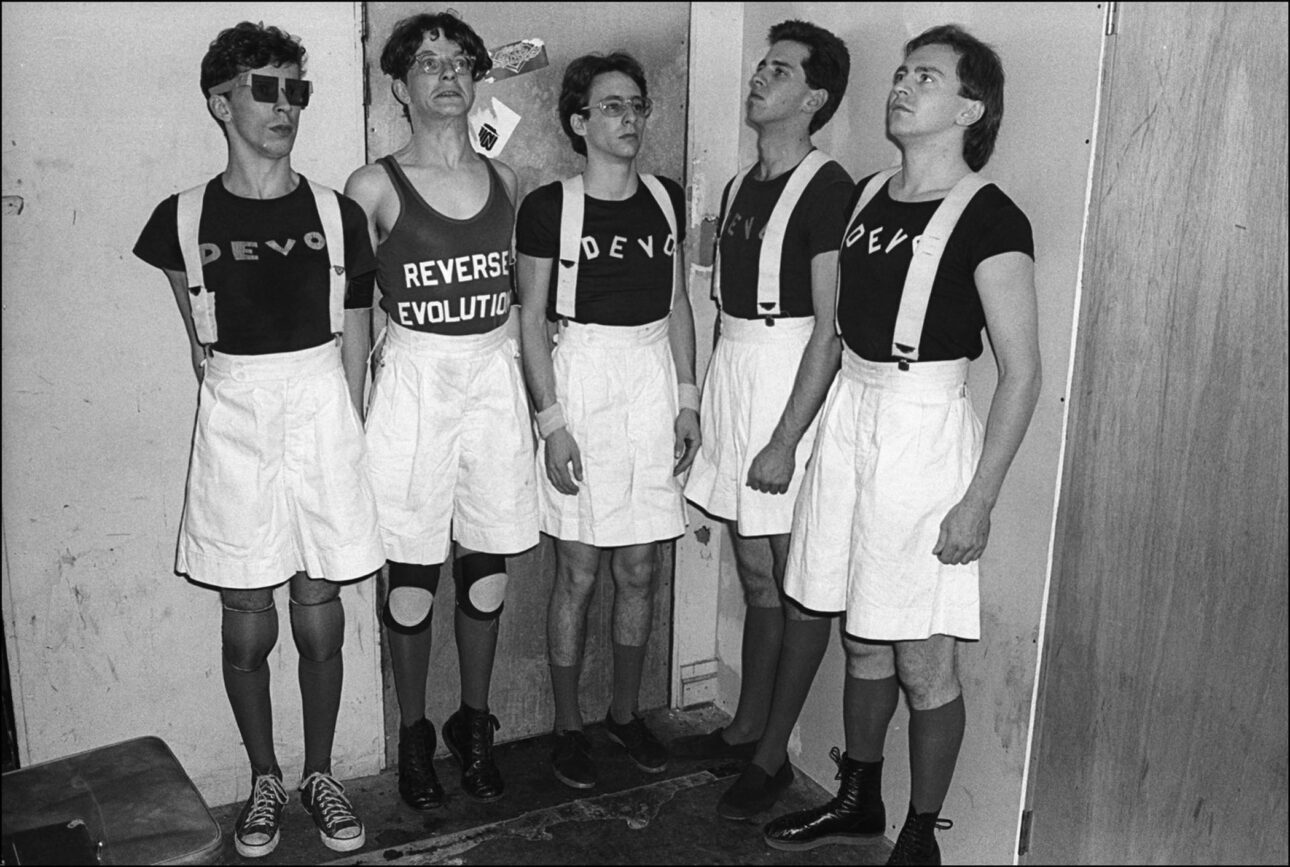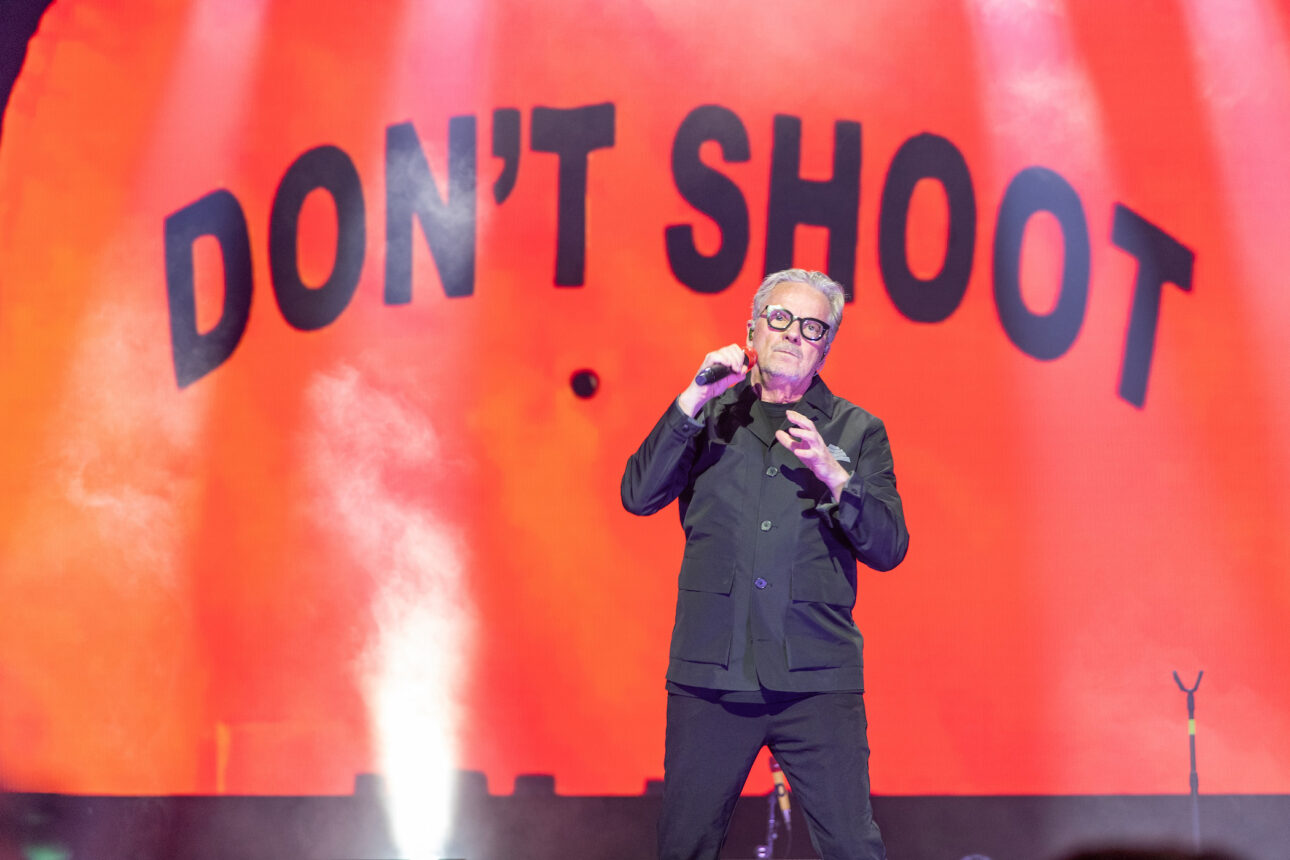‘Hello Spud!’: How a Conversation About Potatoes Ultimately Led To Devo

Three days had passed since the 2024 presidential election and, like millions of other Americans, Devo co-founder/frontman Mark Mothersbaugh was baffled by the outcome. One of the masterminds behind the Postcards for Democracy art project, Mothersbaugh has been deeply interested in politics since the 1970s. Devo itself is short for “de-evolution,” the idea that mankind has stopped progressing and is instead now regressing.
With Donald Trump headed back to the White House, for half of the country it’s difficult to argue otherwise. But for now, Mothersbaugh is doing his best to embrace an alternate perspective.
“I’m just impressed with how many people could be attracted to the president that’s elected now,” Mothersbaugh tells SPIN with a sense of bewilderment. “He’s going to be our president next year. I’m just impressed because his techniques all seem like warning signs of reasons why not to honor him.
“I’m curious to see where it goes because over half the country seems to be approving. Maybe this is a year I learn something that I didn’t know before. I guess it’ll be interesting to see which things he was telling the truth about and which things he was lying about.”
Postcards for Democracy, launched alongside artist Beatie Wolfe in 2020, carries on Mothersbaugh’s tradition of making postcard art, something he did even before the early days of Devo. In fact, it was a postcard that brought Devo bassist Gerald “Jerry” Casale and Mothersbaugh together while studying art at Kent State University.

“I loved postcards in my childhood, and I loved seeing the cards from somewhere exotic, which to me at the time would have been like Myrtle Beach in South Carolina—that was exotic when you grow up in Akron, Ohio, where it’s just kind of factory chimneys everywhere,” he explains. “To get an image and an object from a friend, I was always fascinated by that stuff.
“From the time I was born my eyesight has always been a problem. So doing artwork on small cards was something that appealed to me. When I met Jerry, I was still a freshman, and he was maybe a grad student. I had found out about screen printing and fell in love with it.”
Casale happened to stumble upon one of Mothersbaugh’s postcards and soon approached him, asking “Are you the guy putting astronauts holding potatoes up around campus? My name’s Jerry Casale. I wondered what your interest in potatoes was.”
From there, they got into a long, philosophical conversation about potatoes, humans, and the hierarchy of vegetables. After all, Mothersbaugh always believed potatoes were the “proletariat vegetable.”
“They come from underground and they’re dirty but on everyone’s plate,” he says. “People ate potatoes every day regardless of where you are on the hierarchy, but they never thought about it. They had eyes all around, so they saw everything going on.
“Both of us come from working-class families, so we thought of ourselves as potatoes. We’d interchange the word ‘spud’ with ‘comrade’ and would use it pejoratively and as a ‘welcome comrade’ type thing. ‘Hello spud!’”

A kinship was forged, and they were playing music together by 1973 as “Sextet Devo.” But it wasn’t until 1978 that they released their debut album as Devo with Mothersbaugh at the helm, his brother Bob Mothersbaugh on lead guitar, Casale on bass, his brother Bob Casale on rhythm guitar/keyboards, and Alan Myers on drums. Titled Q: Are We Not Men? A: We Are Devo! and produced by Brian Eno, the bulk of the album was recorded between October 1977 and February 1978 in Cologne, West Germany. Interestingly enough, Germany played another pivotal role in Devo’s development.
David Bowie, who’d produced two albums for Iggy Pop—The Idiot (1977) and Lust for Life (1977)—was performing in Ohio and Devo convinced a woman to go backstage armed with one of their demos, which ultimately wound up with Bowie.
“He threw it in a suitcase with about a hundred other demo tapes that people had given him,” he explains. “When they went back to record Lust for Life, like half a year later, they’re in Germany. Back in the mid-’70s, there was German national radio. It was one station for everybody.

“It was kind of a cool idea, but you’d hear something by Beethoven, then you’d hear something by the Beatles and then you’d hear, like, a marching song. It was all fixed together and you had to sit through this one station. Then finally if you were into the Sex Pistols, for instance, and they finally played a Sex Pistols song, right after that there would be something by Mozart.”
Americans didn’t necessarily want to listen to the radio in Germany because, as he puts it, it would drive them “crazy.”
“Iggy said, ‘Where are all those tapes you got while we were on tour?’” he continues. “So they opened up the suitcase and they’re going through things and they found the Devo demo tape that we’d gotten some girl to give him back in Cleveland. They played it and thought, ‘This can’t be a real band.’”
While they thought it was “weird,” they were captivated by Devo and took a liking to them rather quickly.
“We were playing Max’s Kansas City in New York and Bowie came backstage,” he recalls. “This was the week before Brian Eno showed up and said, ‘Hey, I want to produce you guys.’ We played again and then David Bowie says, ‘I want to produce you guys.’”

Devo then had to admit that they didn’t have a record deal, so Eno offered to fly them to Conny Plank’s studio in Germany, where they would make Q: Are We Not Men? A: We Are Devo! Bowie, who was shooting a film in Berlin at the time, would take the train up on weekends. Warner Bros. eventually signed Devo thanks to Bowie and Pop’s emphatic co-signs.
“It was super fortunate,” he says. “We were super lucky that they both liked the band so much.”
Devo followed up with Duty Now for the Future in 1979, but 1980’s platinum-selling third album, Freedom of Choice, produced the band’s biggest hit—“Whip It.” That era also introduced their signature red, terraced energy dome hats, which became staples of their stage personas.
Despite several breakups and reunions, the group would go on to release six more albums with various lineups, culminating with 2010’s Something for Everybody. Mothersbaugh simultaneously established a fruitful career as a composer for television, video games, and films, most notably Pee-Wee’s Playhouse, Rugrats, and, more recently, Hotel Transylvania: Transformania and Cocaine Bear. With hundreds of credits under his belt, he’s only continuing to add to his résumé. He’ll fly to New Zealand soon to work on his next movie score, A Minecraft Movie starring Jack Black and Jason Momoa, which will arrive in 2025.
“I was told by my agent that I have about 100 hours of music that I wrote just for myself,” he says. “It’s all different styles. Every now and then, I’ll pull something out and use it for, like, a Lego movie or Wes Anderson film or something, but most of it is unheard. I’m going to match it up with this book I’m doing of graphics of postcards, so I’m working on that right now and staying busy.”
Link to the source article – https://www.spin.com/2024/11/hello-spud-devo-mark-mothersbaugh-interview/
Recommended for you
-
Wireless Acoustic Guitar Pickup Rechargable Magnetic And Microphone Soundhole Pickup For Acoustic Guitar Build-In Volume Control(Black)
$83,99 Buy From Amazon -
E-mu Orbit 3 – THE King of Dance Modules – Large Original 24bit Multi-Layer WAVe/Kontakt Samples/Loops Studio Library
$14,99 Buy From Amazon -
JUDKIOM 2 Pack Wireless Lavalier Microphone for iPhone, Professional Lapel Mics, Wireless Mic Plug-Play, Lapel Microphone for Video Recording Interview Vlog YouTube TikTok(for iPhone 14 and Below)
$9,99 Buy From Amazon -
Disco Ball Light,Halloween Party Decorations Lights, USB LED Mini Sound Activated DJ Dance Stage Light Colourful RGB Strobe Lamp for Home Room Dance Karaoke Xmas Happy Birthday Wedding Club Show
$11,99 Buy From Amazon -
Ueteto 2i2 USB Audio Interface, Universal Audio Interface for PC, MAC/Music/Computer Recording and Podcasting with 48V Phantom Power
$69,99 Buy From Amazon -
Pyle Portable, Tabletop Set Machine, Electric Drum Pads,LED Display, Mac & PC, Black (PTED01)
$159,87 Buy From Amazon -
Solid State Logic SSL 12 USB Audio Interface
$499,99 Buy From Amazon -
Donner DED-200X Electronic Drum Set, Electric Drum Kit with Quiet Mesh Drum Pads, 2 Cymbals w/Choke, 31 Kits and 450+ Sounds, Throne, Headphones, Sticks, USB MIDI, Melodics Lessons (5 Pads, 4 Cymbals)
$459,99 Buy From Amazon














Responses